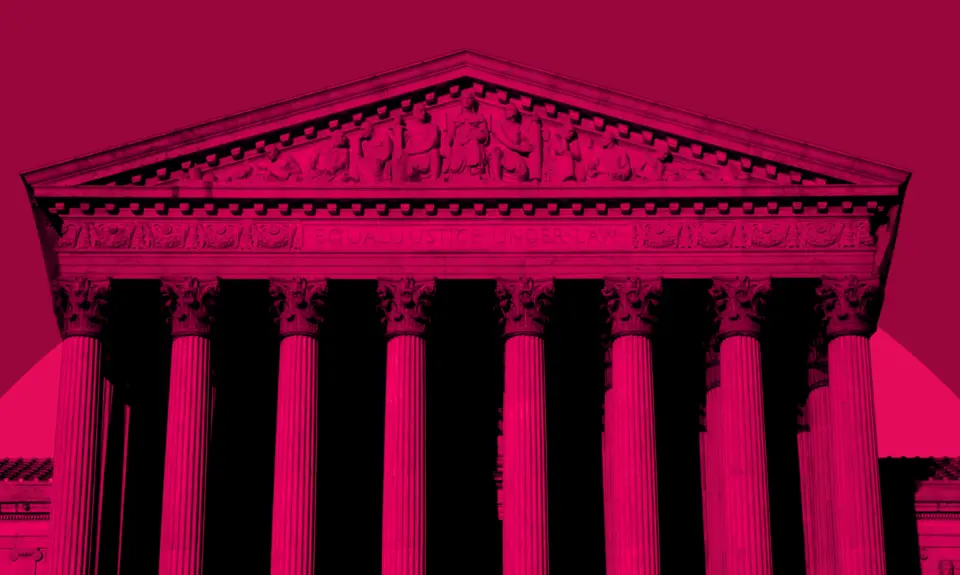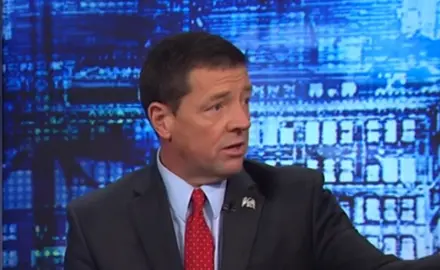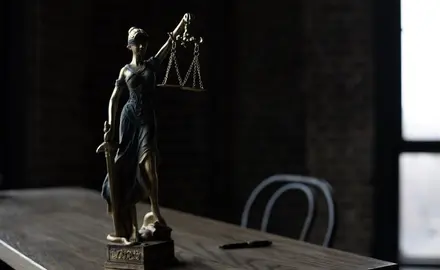Washington D.C. – People For the American Way today released its annual Supreme Court end-of-term report, The Supreme Court's 2023-24 term: A corrupt majority on steroids. The report summarizes key Supreme Court rulings for 2023-24 and looks ahead to cases the Court is slated to hear in 2024-25.
It comes at the end of a cataclysmic term in which the Court, dominated by far-right justices and awash in ethics scandals, further undermined longstanding precedents, failed to protect critical reproductive rights, and – most notably – handed former president Donald Trump a potentially game-changing advantage in the 2024 presidential election, with a ruling that sets back his federal criminal trial on election subversion charges.
Read the full report here.
“We’ve said it before and we’ll say it again: this is a corrupt Court majority on steroids,” said Svante Myrick, president of People For the American Way. “Donald Trump’s hand-picked justices delivered for him in a way that previously would have been unimaginable to most of us. The Court’s ruling giving former presidents unprecedented immunity from prosecution was exactly what Trump ordered and will almost certainly keep him out of federal court, or prison, while he runs for another term. And that ruling was just the icing on a very unsavory cake cooked up this term by this ethically challenged Court, which issued numerous other rulings endangering our rights and freedoms. This is why we have to vote the courts this fall. There’s no way we can allow Donald Trump back in office to pick more judges and justices who will be only too willing to help him destroy our democracy.”
“This Supreme Court has dug itself into a hole so deep, it’s hard to imagine how it will ever regain our trust and confidence,” said Elliot Mincberg, senior fellow at People For the American Way and an author of the report. “Its rulings this term continue to endanger the American people and our democracy. That’s bad enough, but then there are the scandals around gifts and trips for conservative justices, and Clarence Thomas’s refusal to recuse from cases involving the election his wife tried to overturn. We need meaningful Supreme Court reform. And we must defeat Donald Trump in November, or this ongoing disaster for our legal system and our country will only get worse.”
SUMMARY OF HIGHLIGHTED CASES:
INSURRECTION-RELATED CASES:
Trump v. United States. On the final day of the term, the Court’s far-right majority issued a very troubling decision on the immunity of former presidents, like Donald Trump, from criminal prosecution. This virtually guarantees that Trump will not face a jury trial before the election on his efforts to stir up an insurrection and overturn the results of the 2020 election. The ruling creates unprecedented immunity for former presidents while setting forth a tiered system of presidential acts enjoying varying levels of immunity. The Court’s opinion did not resolve whether Trump is absolutely immune from all the charges in the DC federal indictment against him, but instead sent the case back to the district court to determine how to characterize Trump’s conduct. Justice Sonia Sotomayor strongly dissented, writing that the ruling threatens to transform the entire range of a president’s official conduct into a “law-free zone.”
Trump v. Anderson: In this case, the Court ruled that Colorado could not bar Donald Trump from its presidential ballot, despite a state supreme court ruling that Trump had engaged in insurrection and therefore could be barred under Section 3 of the Fourteenth Amendment. Five of the Court’s far-right justices then went further and wrote that the only way to bar an insurrectionist from federal office is by Congressional statute. But Justices Sotomayor, Kagan, and Jackson pointed out that it makes no sense to say that Section 3 is unenforceable until Congress passes a law saying how it would be put into effect. The three sharply criticized the majority for its “attempts to insulate all alleged insurrectionists from future challenges to their holding federal office.”
Fischer v. US. The Supreme Court’s 6-3 decision narrowed the reach of one of the criminal statutes used to prosecute Trump and some of the January 6 insurrectionists. Joseph Fischer was one of the Trump supporters who is accused of breaking into the Capitol on January 6, 2021. The Court ruled that Fischer could not be charged under a particular statute that is violated when a person “impair[s] the availability or integrity for use in an official proceeding of records, documents, objects, or” other things. The ruling was somewhat limited and should not interfere with the prosecution of the vast majority of those individuals
VOTING RIGHTS
Alexander v. South Carolina Conference of the NAACP. The Supreme Court issued a harmful 6-3 ruling in this gerrymandering case, weakening Black Americans’ ability to fully participate in our democracy. The case arose when South Carolina Republicans drew a map that moved more than 30,000 Black voters out of a congressional district, which made it whiter and more likely to elect a Republican. The South Carolina NAACP went to court, claiming the move was racially motivated, and won. But on appeal the Supreme Court majority decided that the redistricting was a permissible political gerrymander, rather than an illegal racial gerrymander. The ruling makes it easier for politicians to draw unfair voting maps that reduce the political power of Black Americans.
REPRODUCTIVE FREEDOM
Food and Drug Administration (FDA) v. Alliance for Hippocratic Medicine. Following the overturning of Roe v Wade, conservatives targeted the availability of medication abortion. They created an organization called the Alliance for Hippocratic Medicine to manufacture a lawsuit against the FDA, which had approved the abortion medication mifepristone, and argued against all the evidence to the contrary that mifepristone is dangerous. The Supreme Court dismissed the case, ruling that the Alliance had no standing to sue. Mifepristone remains available, but threats remain. The Court did not address the actual substance of the lawsuit and effectively “kicked the can down the road” to a time when the Far Right will inevitably sue again.
Moyle v. United States. Shortly after the Dobbs ruling overturning Roe v Wade, controversies arose about a federal law that concerns abortion care in emergencies. The 1986 federal Emergency Medical Treatment and Labor Act (EMTALA) requires emergency rooms in hospitals that receive Medicare funding to provide “necessary stabilizing treatment” to patients who arrive with an “emergency medical condition.” Idaho law severely restricts abortions, prohibiting them except when necessary to save the life of the mother, regardless of dangers to the mother’s health. The Biden Administration went to federal court in Moyle and maintained that EMTALA supersedes Idaho’s law. The Court dismissed the case, preserving emergency care access in Idaho for now. But Justices Alito, Thomas, and Gorsuch dissented, and the Court will likely face the issue again.
GUN SAFETY
United States v. Rahimi. Under the federal Violence Against Women Act, it is illegal for someone subject to a domestic violence restraining order to possess a firearm or ammunition. Zackey Rahimi was subject to a restraining order in 2019, after he assaulted and threatened his girlfriend. In 2020 and 2021, he was involved in five different shootings. When police searched his home, they found firearms. He was convicted for possessing them, but claimed this violated his Second Amendment rights. The Supreme Court upheld his conviction, but the fact that such an extreme claim made it to the nation’s highest court is significant. It shows how much damage Trump judges and justices have done to our judicial system, following the Court’s dangerous decision in New York State Rifle & Pistol Association v. Bruen, severely weakening the ability of states and cities to set reasonable restrictions on firearms.
Garland v. Cargill. In a 6-3 ruling made possible by the three Trump justices, the Supreme Court invalidated a federal rule that subjects semi-automatic rifles equipped with bump stocks to the same restrictions and penalties as machine guns. The ruling ignores the fact that bump stocks, such as the one used in the 2017 Las Vegas shooting that killed and injured hundreds of people, cause weapons to perform in exactly the same deadly manner as machine guns. In her dissent, Justice Sotomayor noted that the majority’s “artificially narrow definition” of machine gun “hamstrings the Government’s efforts to keep machine guns from gunmen like the Las Vegas shooter.”
WORKERS’ RIGHTS
Starbucks v. McKinney. In this case, the Supreme Court majority ruled against employees seeking to protect their rights to organize. The majority set a standard for courts to follow that will make it harder for workers in the future to get relief from unfair labor practices. The case concerns a group of Starbucks employees who tried to unionize one of its stores in Memphis. After news coverage of the effort, Starbucks fired them. Congress long ago made it illegal to fire people as retaliation for their effort to unionize. The union helping the workers organize filed a complaint with the National Labor Relations Board, and the NLRB made a preliminary finding that an unfair labor practice had occurred and Starbucks shoulder-hire the employees pending final resolution. But the Supreme Court ruled against the employees, based on the majority’s interpretation of the authority of the NLRB.
UNDERMINING EFFECTIVE HEALTH, SAFETY, AND ENVIRONMENTAL PROTECTIONS
Relentless v. Department of Commerce and Loper Bright Enterprises v. Raimondo. In two companion cases, the Court’s far-right majority took the monumental step of overturning the Chevron doctrine which for 40 years had supported federal agency authority for protecting public health and safety. Both of these cases involved challenges by fishing companies to a rule issued by one such agency, the National Marine Fisheries Service. The companies challenged the NMFS’s authority to monitor them for overfishing. In ruling for the corporations, the Court set the stage for a massive upending of thousands of existing rules protecting health, safety and rights, while chilling future efforts to regulate businesses on behalf of consumers and the public. Kym Meyer, litigation director for the Southern Environmental Law Center, called the majority’s ruling a “recipe for chaos.”
SEC v. Jarkesy. This case also threatens federal agency ability to protect the public. As part of its regular activity to enforce congressional laws, the Securities and Exchange Commission brought a civil penalty proceeding against George Jarkesy, Jr., for misleading investors and fraud in marketing hedge funds. After a full trial before an administrative law judge, the SEC found him guilty and ordered him to pay a civil penalty of $300,000 and to disgorge over $680,000 in illicit gains. Jarkesy challenged the SEC’s authority and demanded a jury trial instead. The Court agreed with him, throwing into doubt the ability of the SEC and other agencies to enforce laws passed by Congress.
Corner Post v. Board of Governors of the Federal Reserve System. In the last week of its Term, the Court issued yet another 6-3 ruling in which the far-right majority harmed regulatory agencies by making it easier to challenge regulations, even those that were promulgated long ago. The majority held that a company or others can challenge a rule within six years of when the rule began to injure the plaintiff, even if this happened many years – 13 years in Corner Post –after the agency’s action. Justice Ketanji Brown Jackson’s dissent for herself and Justices Sotomayor and Kagan stated that the decision could have “staggering” consequences, especially in light of the right-wing majority’s decision overturning the Chevron doctrine.
Ohio v. EPA. It has long been recognized that air can and does carry pollution across state borders. As part of the Clean Air Act, Congress required that states submit State Implementation Plans (SIPs) to implement their obligations under the law that comply with the law’s “Good Neighbor Provision.” After the EPA disapproved a number of states’ SIPs, several states went to court to challenge the action. In an opinion by Justice Neil Gorsuch, joined by Trump justice Brett Kavanaugh and by Chief Justice Roberts along with Justices Clarence Thomas and Samuel Alito, a 5-4 majority granted the states’ request and stopped any EPA implementation of the Good Neighbor Policy until the states’ lawsuit concludes, which is likely to take years. As Earthjustice’s Senior Vice President Sam Sankar stated, the Court has put “thousands of lives at risk.”
Consumer Financial Protection Bureau (CFPB) v. Community Financial Services Association of America. This case was a constitutional challenge to the way the CFPB is funded. The CFPB had adopted a Payday Lending Rule to protect people from unfair and abusive lending practices. Two associations of companies regulated by the rule went to court to have it overturned. A panel of Trump judges on the far-right Fifth Circuit ruled that the way the agency was funded was unconstitutional. Fortunately, the Supreme Court disagreed and ruled for the CFPB. The case could have had the potential of calling into question nearly everything the CFPB has done since its creation. But the fact that the lawsuit got as far as it did shows the impact of far-right lower court judges.
COUNTERING DISINFORMATION
Murthy v. Missouri. This was a challenge to the Biden administration’s efforts to inform social media companies when their sites are being used for harmful disinformation, especially about COVID-19 vaccines and the 2020 election. In a 6-3 opinion by Justice Barrett, the Court ruled that none of the complaining parties had standing to sue in federal court. Like the mifepristone lawsuit, this case should never have made it this far. The fact that it did shows how right-wing plaintiffs once again were able to find a way to get a Trump district court judge to put ideology over the law and help advance their cause.
###
About Us
People For the American Way is a national progressive advocacy organization that inspires and mobilizes Americans to defend freedom, justice, and democracy from those who threaten to take them away. For more than four decades, we have been dedicated to making the promise of America real for everyone and have worked toward a vision of a vibrant America where basic rights and freedoms are upheld for all, not just the wealthy and the powerful. Learn more: http://www.peoplefor.org



